The Indian Prime Minister Narendra Modi through a video conference today spoke with Indian astronaut Group Captain Shubhanshu Shukla, who became the country’s first astronaut to visit the International Space Station, India’s PMO said in a Press release.
PM Modi said that although though Shubhanshu Shukla is currently the furthest distant from the Indian homeland, all Indians still hold him in the highest regard. He observed that Shubhanshu’s travel signifies the start of a new era, and his name itself holds auspiciousness.
Hei said that although though it was a two-person talk, it captured the passion and feelings of 140 crore Indians.
He expressed his sincere congratulations and best wishes to Shubhanshu for raising India’s flag in space, saying that the voice he heard conveyed the pride and fervor of the entire country.
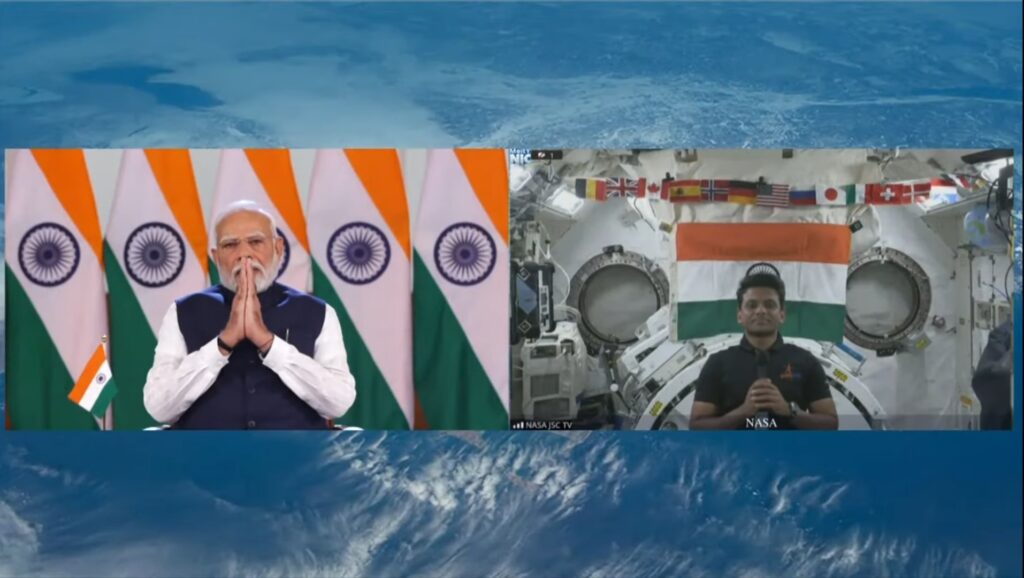
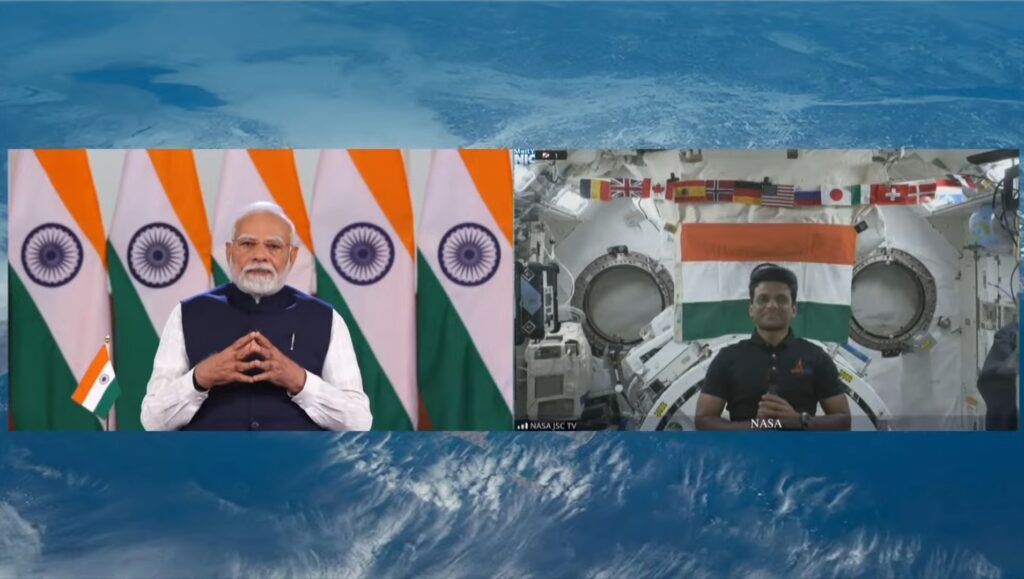
Group Captain Shubhanshu Shukla is an ISRO astronaut and test pilot in the Indian Air Force. He is presently on-board the Axiom-4 Mission and will be the first of four astronauts to journey into space as part of the Indian Human Spaceflight Program.
With their first government-sponsored flight in over 40 years, India, Poland, and Hungary will “realize the return” to human spaceflight through the Ax-4 mission.
Ax-4 will be the first time all three countries have conducted a mission aboard the International Space Station, even though it is these countries’ second-ever human spaceflight mission. This landmark flight demonstrates how Axiom Space is advancing national space programs around the world and rethinking the route to low-Earth orbit.
On June 25 at 2:31 a.m. ET, the Ax-4 crew departed LC-39A at NASA’s Kennedy Space Center and boarded a SpaceX Dragon spaceship to the International Space Station.
Since its launch on June 25, 2025, Shubhanshu Shukla has been the pilot of the continuing Axiom Mission 4 mission to the International Space Station. He joins mission specialists Sławosz Uznański-Wiśniewski and Tibor Kapu in a crew under commander Peggy Whitson. The backup crew member was fellow ISRO astronaut Prasanth Nair, who also trained at NASA’s Johnson Space Center in Houston.
The goal of the NASA, SpaceX, and ISRO-led mission is to improve collaboration in international spaceflight. After cosmonaut Rakesh Sharma, Shukla is the second Indian to reach orbit and the first Indian astronaut to visit the International Space Station. His seat is expected to cost around ₹500 crore, or the “mid-$60-million range.”
Shri Modi asked how Shubhanshu was doing and if everything on board the space station was going okay.
In response to the Prime Minister Modi, astronaut Shubhanshu Shukla said he is in good health and is touched by the affection and blessings he has received. He also thanked the Prime Minister on behalf of 140 crore Indians.
According to him, his stay in orbit was a unique and profound experience that mirrored both his own path and India’s current trajectory. “My 400-kilometer trip from Earth to orbit is indicative of the dreams of countless Indians,” according to India’s PMO press release, the astronaut said.
Recalling his childhood, he stated that he had never envisioned himself as an astronaut, but that, with the Prime Minister’s guidance, modern India allows for such aspirations. Shubhanshu said he was extremely proud to have served his country in space and called it a great achievement.
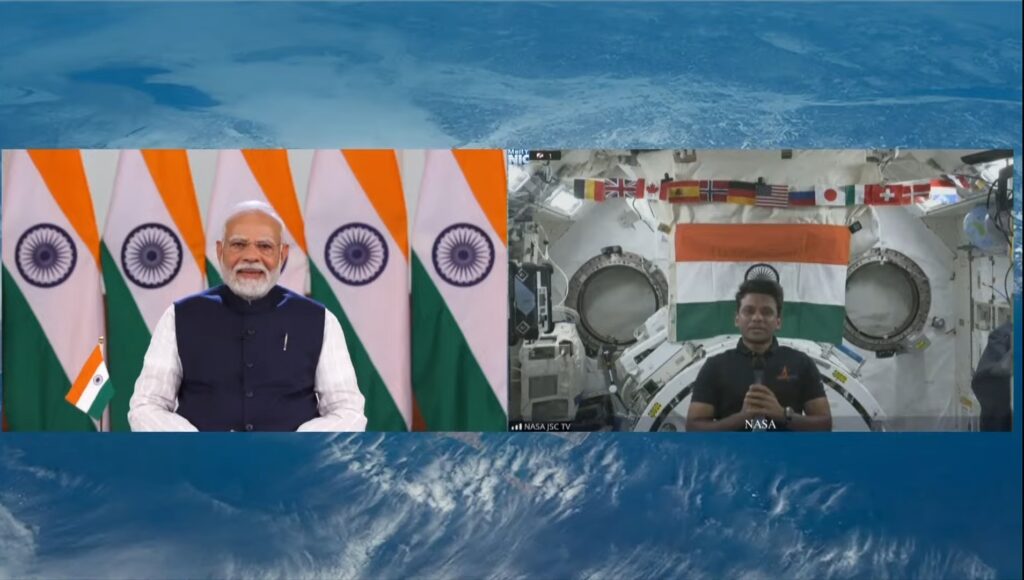
With a hint of humor, the prime minister said that even though Shubhanshu is in space, where gravity is almost nonexistent, every Indian can see how grounded he stays. He inquired as to if his fellow astronauts had been given any of the carrot halwa that Shubhanshu had brought from India.
Shubhanshu Shukla revealed that he took a number of traditional Indian dishes, including as aam ras, carrot halwa, and moong dal halwa, to the space station. He stated his intention to introduce his overseas colleagues to the many culinary traditions of India.
“They all sat together and enjoyed the delicacies, which were very warmly appreciated,” he told the prime minister Modi, added in a press release.
According to him, his fellow astronauts loved the flavors so much that several of them even said they would like to travel to India someday to eat these foods there.
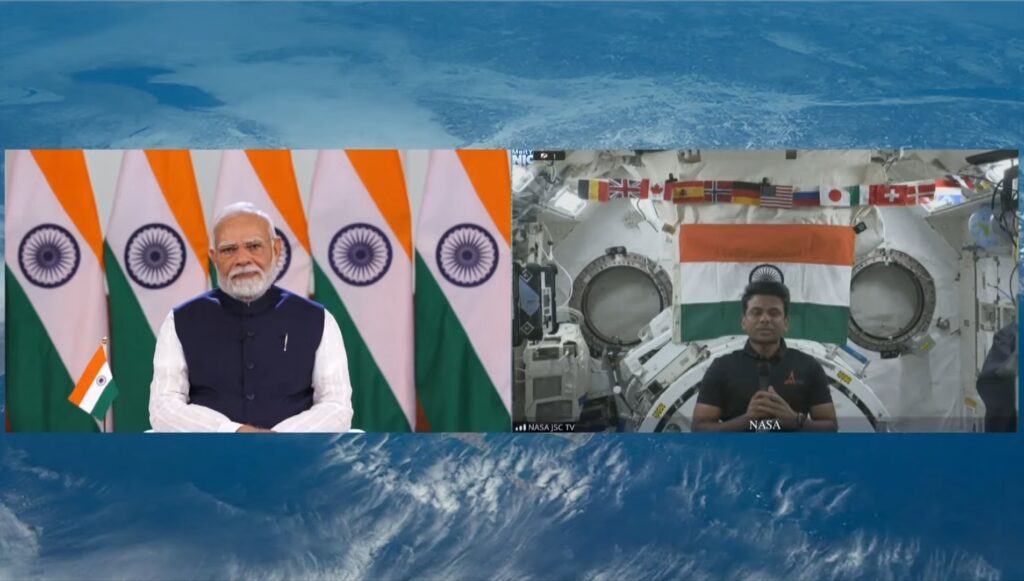
The Prime Minister said that Shubhanshu now had the unique privilege of conducting parikrama of Mother Earth herself, noting that parikrama, or circumambulation, has been a treasured Indian ritual for millennia.
PM Modi asked which region of the planet Shubhanshu could be now orbiting. In response, the astronaut stated that although he did not know the precise location at that moment, a short time ago, just a short while earlier, Through the window, he could see that they were flying above Hawaii.
He revealed that they do 16 orbits every day, which allows him to observe 16 sunrises and 16 sunsets from space. He still finds this to be an incredible experience.
They are currently traveling at around 28,000 kilometers per hour, but he explained that the velocity is not noticeable inside the spaceship. But this tremendous energy, he thought, symbolically reflects the speed at which India is developing now.
In response to the Prime Minister, Shubhanshu Shukla revealed that the first thing that sprang to mind as he entered orbit and saw how big space was was the image of Earth.
He said that it is impossible to perceive borders from space because there are no discernible borders between countries, and the planet’s utter togetherness was what most struck him.
He pointed out that because maps flatten a three-dimensional reality onto paper, we frequently see a skewed image when comparing the sizes of nations, including India.
However, Shubhanshu said that India seems genuinely magnificent from space, both in terms of size and soul. He went on to talk about the overpowering sense of unity he felt, a profound insight that is entirely consistent with India’s national motto of “unity in diversity.” He explained that when viewed from above, Earth appears to be a single, communal home, serving as a reminder to humanity of our innate unity and interconnectedness.
The Prime Minister asked Shubhanshu Shukla, who was the first Indian to board the International Space Station, about the differences between his hard preparation on Earth and the conditions on board.
The astronaut revealed that even though they had prior knowledge of zero gravity and the nature of the research, the actuality in space was quite different. The human body gets so used to gravity, he said, that even the simplest tasks in microgravity become surprisingly difficult.
He jokingly mentioned that he had to strap his feet down during the conversation since he might otherwise float away. He went on to say that basic tasks like sleeping or drinking water become extremely difficult in space.
Shubhanshu outlined how direction becomes fluid, allowing one to sleep anywhere—on the walls, the ceiling, or anywhere else. It takes a day or two to get used to this new atmosphere, but he called the encounter a lovely fusion of awe and science.
In response to the question of whether mindfulness and meditation had helped him, Shubhanshu Shukla strongly concurred with the Prime Minister’s assessment that “science and spirituality are twin foundations of India’s strength.”
He confirmed that India is already making great strides and that his objective is just the beginning of a much longer national journey. He saw many more Indians traveling to space in the future, even setting up their own space stations.
Shubhanshu emphasized how important mindfulness is in this kind of setting. Mindfulness aids in preserving inner peace and clarity amid demanding training or the stressful times of launch. He explained that making wise choices in space requires maintaining mental equilibrium.

He cited an insightful Indian proverb that states that one cannot eat while running, emphasizing that the more composed one is, the better decisions one makes. According to Shubhanshu, the combination of science and mindfulness practices significantly improves both mental and physical adaption to such demanding circumstances.
The Prime Minister questioned if any of the space experiments being carried out would have any future advantages for the medical or agricultural fields. According to Shubhanshu Shukla, he has brought seven original experiments to the space station for the first time, created by Indian scientists.
According to him, the first experiment planned for that day is about stem cells. He clarified that the body loses muscle when gravity is not there, and the experiment aims to determine whether certain supplements can stop or slow this loss. He emphasized that the findings of this study may have immediate benefits for the world’s elderly population suffering from age-related muscle deterioration.
Shubhanshu added that the growth of microalgae is the subject of another experiment. Despite their diminutive size, microalgae are quite nutritious, he said. He pointed out that it might greatly improve food security on Earth if techniques are created to grow them in greater quantities based on the results in space.
He emphasized that one significant benefit of carrying out studies in space is that biological processes proceed at a considerably faster rate there, allowing researchers to get data far more quickly than they could on Earth.
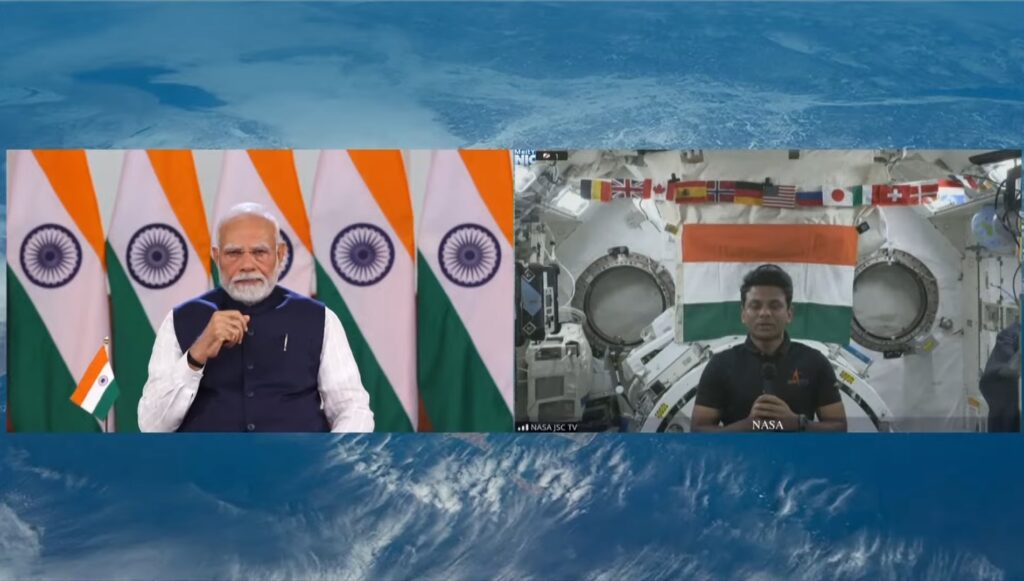
The Prime Minister noted that India’s youngsters and youth now have a revitalized interest in science and a burgeoning passion for space exploration as a result of Chandrayaan’s achievement.
“That resolve is being further strengthened by Shubhanshu Shukla’s historic trip,” Modi said, India’s PMO added in a press release.
PM Modi stated that children today think they can reach the sky and no longer merely gaze at it. He emphasized that the real cornerstone of India’s next space missions is this attitude and goal.
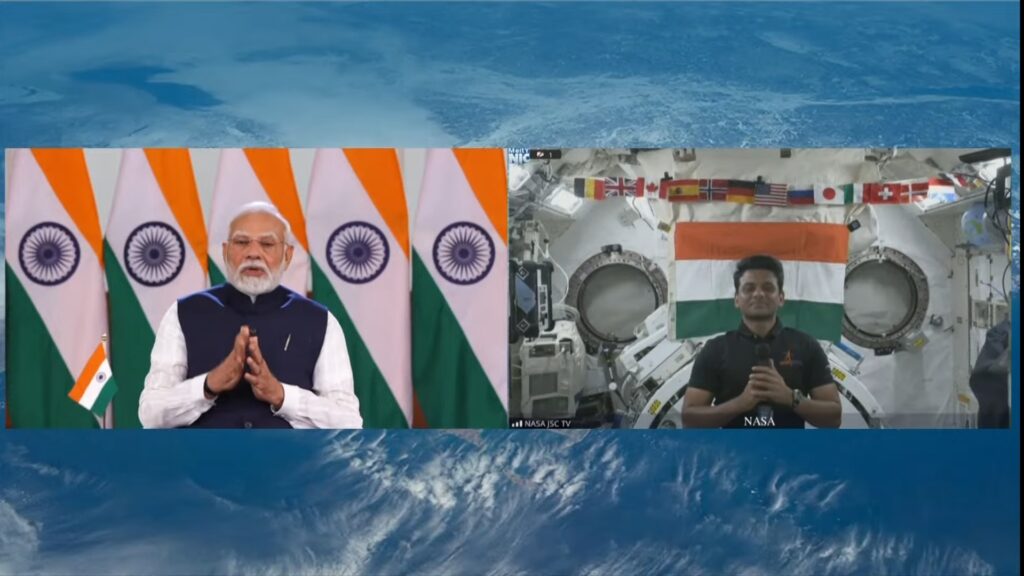
Shubhanshu Shukla was asked by the Prime Minister what message he wanted to get across to India’s young.
In response to the prime minister, Shubhanshu Shukla spoke to India’s youth and praised the nation’s audacious and aspirational course. He emphasized that every young Indian must be involved and dedicated to realizing these goals.
He said that while everyone has a different path to success, persistence is the one thing that all of them have in common. He encouraged the young people to never give up, saying that no matter where they are or what path they take, success would eventually arrive if they do not give up.
The Prime Minister expressed his confidence that the remarks made by Shubhanshu Shukla will significantly motivate India’s young. As usual, he added, he never concludes a discussion without giving some “homework.”
India must proceed with Mission Gaganyaan, construct its own space station, and land an Indian astronaut on the moon, he emphasized. He claimed that these next missions would greatly benefit from Shubhanshu’s space experience.
PM Modi expressed confidence that Shubhanshu was keeping thorough notes on his observations and lessons learned throughout the mission.
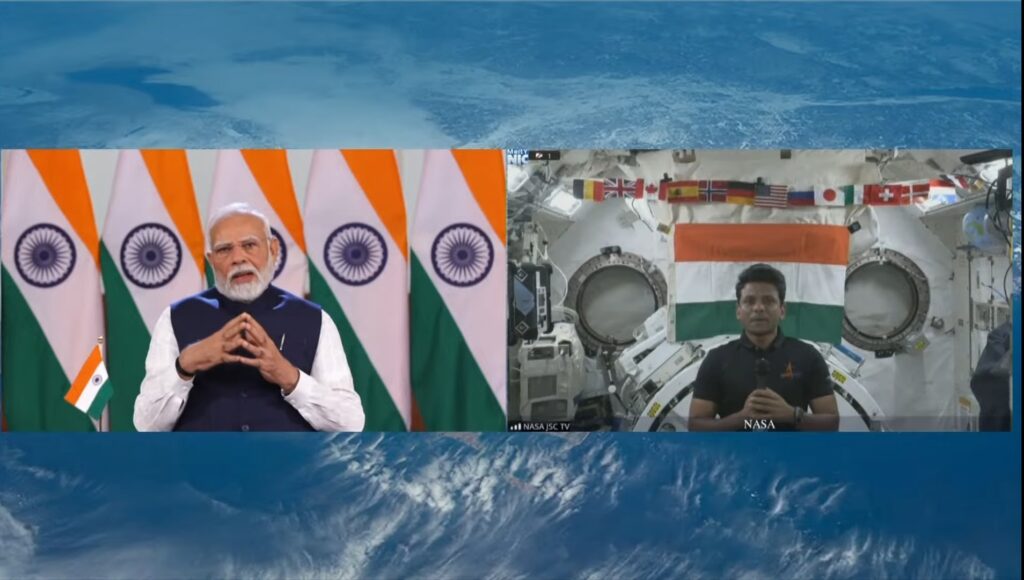
Shubhanshu Shukla confirmed that he has taken in all of the knowledge he has gained during his training and current assignment like a sponge.
“The lessons learned from this experience will be extremely relevant and significant for India’s future space endeavors,” he said, as per the press release.
He conveyed his assurance that he would use these insights to expedite mission execution when he returned. He mentioned that his foreign coworkers on the expedition had asked him about their chances of taking part in Gaganyaan, which he thought was encouraging. He answered them optimistically, “Very soon.”
Shubhanshu reaffirmed that this dream would soon come true and that he is totally dedicated to using all of his knowledge to make it happen as soon as possible.
Declaring his belief that Shubhanshu Shukla’s message will motivate India’s youth, Shri Modi recalled meeting Shubhanshu and his family before to the trip and noted that they were equally passionate and emotional.
He expressed how much he enjoyed talking to Shubhanshu and acknowledged the difficult duties he performs, particularly when traveling 28,000 kilometers per hour.
The Prime Minister confirmed that this was the first step towards India’s Gaganyaan mission’s success. He said that Shubhanshu’s historic voyage would enhance and quicken India’s transition to a developed country and was not just confined to space.
“India is opening new frontiers in space for the world and that the country will now not just soar, but also build launchpads for future flights”, stated Shri Modi.
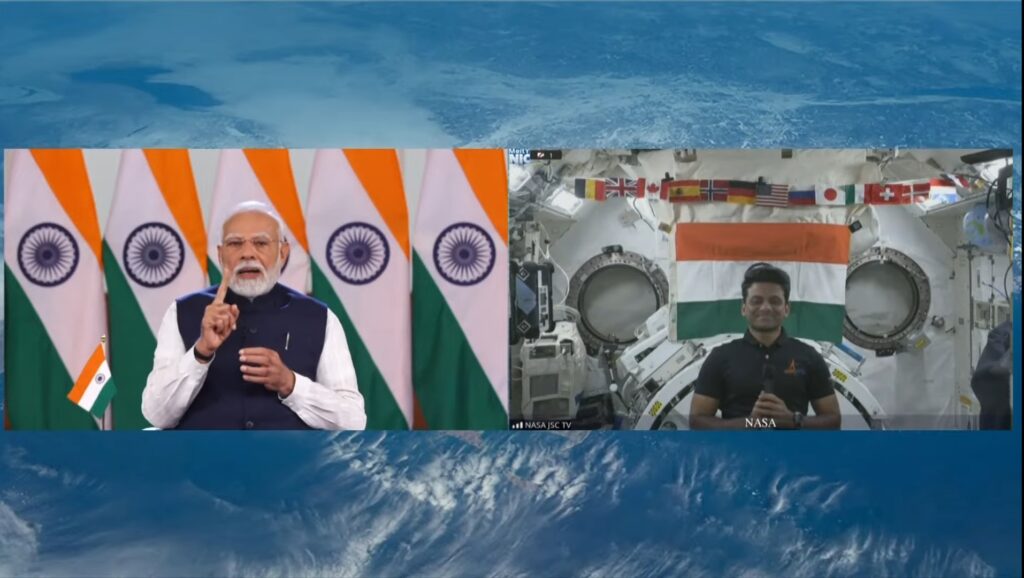
He said that he—and the whole country—were ready to listen and invited Shubhanshu to speak freely from the heart, not in answer to a question but as an expression of any thoughts he wanted to impart.
Shubhanshu Shukla expressed gratitude to the Prime Minister and considered the breadth of knowledge he has gained during his training and space flight. While acknowledging his own sense of triumph, he emphasized that this goal is part of a far greater national accomplishment.
He spoke to all of the children and young people in attendance, urging them to think that improving their own futures helps improve India’s future.
“The sky has never been the limit,” he said, not for them, not for him, and not for India. In order to illuminate their own and the country’s future, he asked young people to cling to this belief.
Shubhanshu conveyed genuine happiness and passion at the chance to communicate with the Prime Minister and, via him, 140 crore people.
He revealed a poignant fact: the Indian national flag, which was visible behind him, had never before been seen at the ISS. It was only raised after he arrived, therefore the occasion was extremely significant. He claimed that seeing India presently on board the International Space Station filled him with great pleasure.
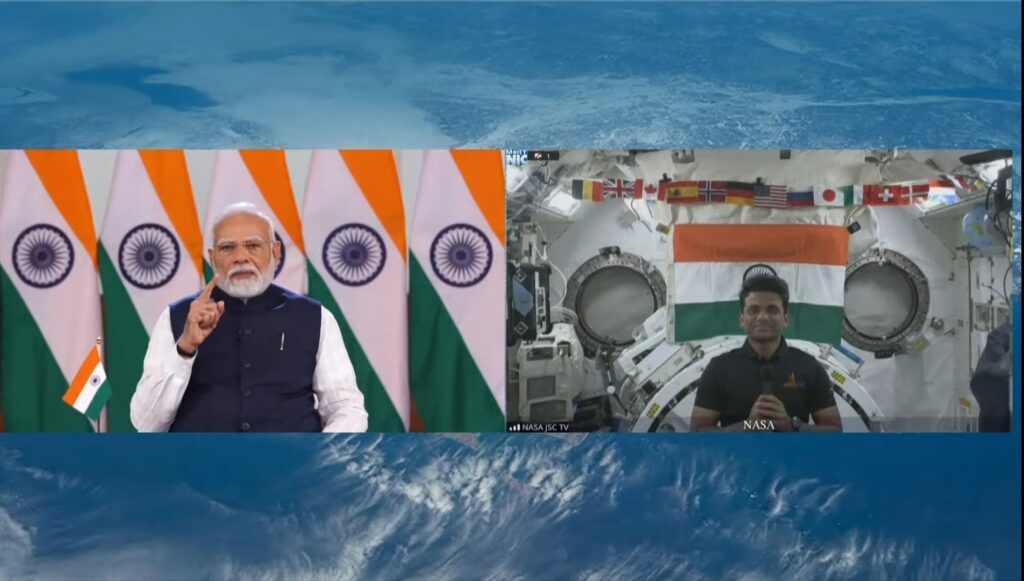
PM Modi expressed his sincere hope for the mission’s success to Shubhanshu Shukla and all of his fellow astronauts.
He told Shubhanshu that the country is waiting for him to return and advised him to look after himself. On behalf of 140 crore people, he sent Shubhanshu innumerable well wishes and urged him to keep preserving the honor of Maa Bharati.
PM Modi ended by expressing my appreciation for the tremendous work and commitment that enabled Shubhanshu to achieve such success.
